Martina Anderson: What is going on with Sinn Féin in Derry?
- Published
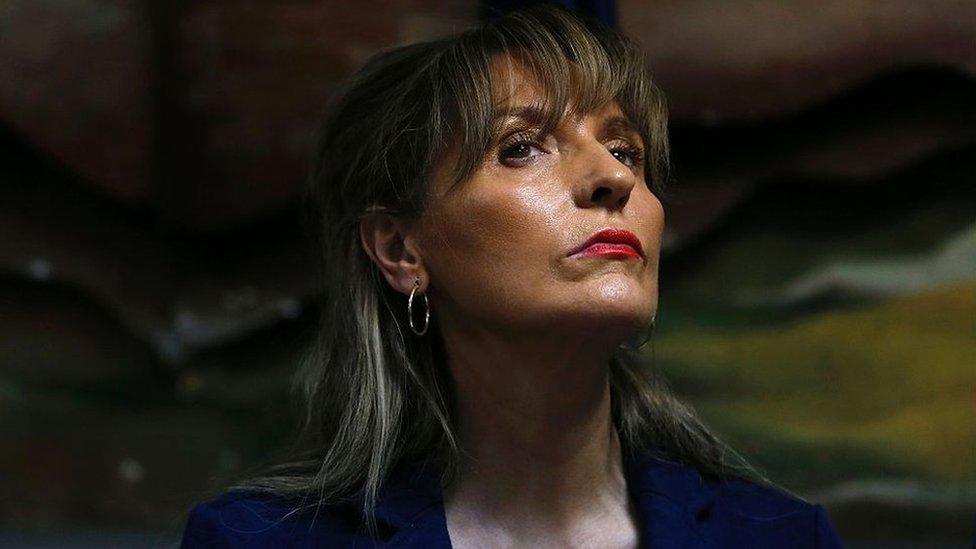
Martina Anderson is one of Sinn Fein's most high-profile figures, having represented the party as an MLA, junior minister and MEP since 2007
Sinn Féin's shakeup of its operations in Foyle has led to the high-profile withdrawal of seasoned politician Martina Anderson and party colleague Karen Mullan.
The pair have separately announced that they will not contest the next assembly election, due to take place in May 2022, following a review of the party's structures in Londonderry.
The move is particularly noteworthy given that Ms Anderson is one of the party's most high-profile figures, having prominently represented the party as an MLA, junior minister and MEP since 2007.
Party president Mary Lou McDonald paid tribute to Ms Anderson and Ms Mullan, and said she acknowledged that "the process of reorganisation and change is challenging".
"It is my belief that our best days lie ahead in Derry and nationally as a new generation of republicans come forward," she added.
So how did we get here?
At the end of 2020, the Sinn Féin leadership initiated a party review of its operations in the city, following recent poor election performances.
Sinn Féin toppled the SDLP from its long-held Foyle Westminster throne in June 2017 when Elisha McCallion narrowly defeated incumbent, Mark Durkan, by just 169 votes.
Mr Durkan had been the city's MP for 12 years.
Ms McCallion's win had ended the SDLP's 34-year grip on the Foyle seat and was seen as a considerable electoral coup for the party.
Fast forward to the general election of December 2019 and what was initially thought would be a tight race between Ms McCallion and SDLP leader Colum Eastwood turned out to be a bruising and embarrassing defeat for Sinn Féin, as Mr Eastwood cantered home with a massive 17,000 vote majority.

Elisha McCallion (red coat) and Colum Eastwood (blue jacket) posed for a photograph during the 2019 general election campaign
2019 had already been a bad year for Sinn Féin in the city.
In the local elections that spring, the party lost five seats, wiping out its dominance on Derry and Strabane District Council and putting it neck-and-neck with the SDLP, with 11 seats each.
What was the purpose of the review?
In the wake of the December 2019 election, former Sinn Féin MLA for Foyle, Maeve McLaughlin, described the party's performance as a "major body blow", an "awful slap" and argued action must be taken.
She said the party had to examine its policy and wider strategy in the seat.
"Sinn Féin locally needs to not only listen, not only reflect, but take action in relation to the mood that exists in the city," Ms McLaughlin said at the time.
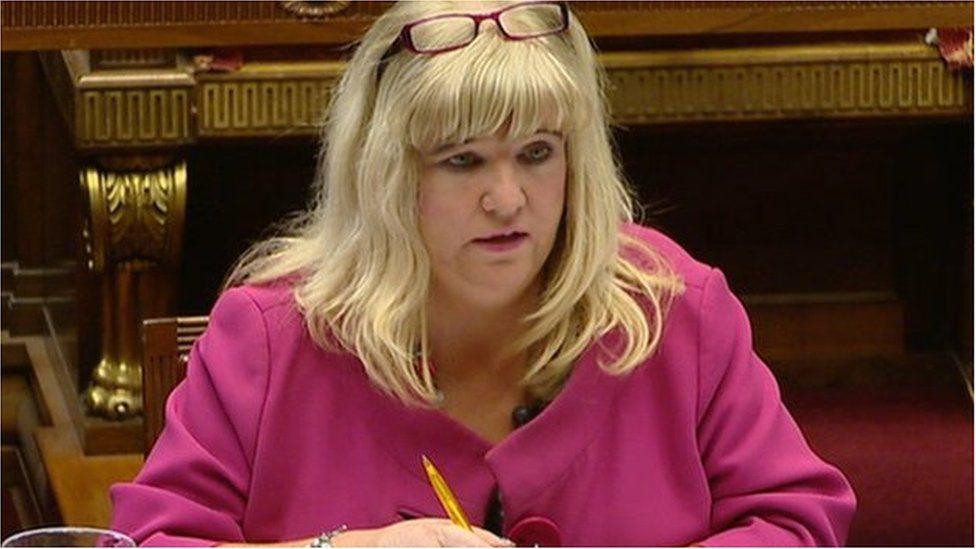
Maeve McLaughlin said the 2019 election defeat was an "awful slap" for the party in Derry
"It's a time for tough conversations and I do believe that includes all of the key issues, all of the key personnel and all of the key policy directions locally."
She said the party could "turn this around" if the processes were "overhauled, reviewed and acted on".
That was perhaps a hint of what was to come.
The party said last month, following a report in the Irish Examiner, external, that it had carried out a restructure in the city and had accepted recommendations from the review.
It said it had agreed to set up an electoral strategy group, which would be established in the Foyle constituency ahead of next year's assembly elections.

The party said last month that it had carried out a restructure of the party in Derry
The Irish Examiner later reported that as a result, a clear out of party faithful in the city had been initiated, with both Ms Anderson and Ms Mullan included in that, external.
Ironically, the poor electoral performances that sparked the internal review did not involve either Ms Anderson or Ms Mullan.
But the move to oust the pair signals party unease at their ability to retain the two assembly seats in next year's elections.
What have Martina Anderson and Karen Mullan said?
Ms Anderson - a long-time republican whose career with the party has spanned decades - had initially not commented on the Derry review or on the reports about her demise.
But on Tuesday evening, she posted a video on Twitter, external that announced her decision to step aside and described the review recommendation as a "body blow".
She said she had received solidarity from supporters "across Derry and beyond" urging her to stay on in the role, which she was co-opted to in January 2020 after losing her MEP seat when the UK left the EU.
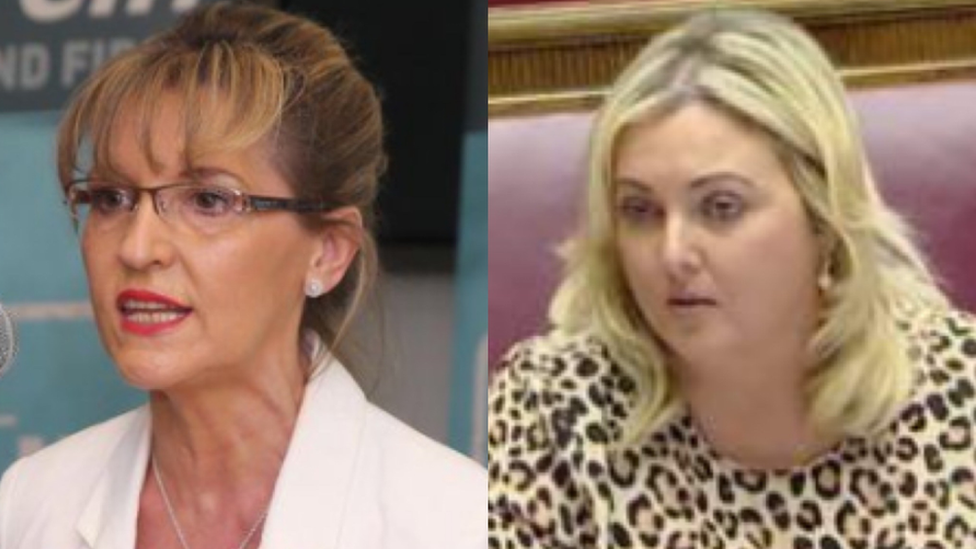
Martina Anderson and Karen Mullan have announced they will not contest the next assembly election
She described it as a difficult time for herself and Ms Mullan.
"The national leadership correctly wants to re-energise our base and since coming back from Europe, I have sought to do just that," she said.
"Throughout my life as a republican I have always put our struggle first and so, in wanting what the leadership believe to be best for it, I have decided not to seek the nomination to contest the next assembly election."
Ms Mullan, co-opted to the assembly in 2017 to replace Ms McCallion, also posted on social media that it had been a great privilege to serve Derry.
What are the implications of this?
Political analyst Chris Donnelly said the move is "extremely significant" for Sinn Féin.
"Martina Anderson is a veteran republican figure, very well respected. Sinn Féin were clearly very stunned by what happened in Foyle over the last few years," he told BBC Radio Foyle's Breakfast Show.
"It's been a story for Sinn Féin of recognising at a national level that there is a problem across the north, it is not just in Derry, but it has been most acutely felt electorally in Derry.
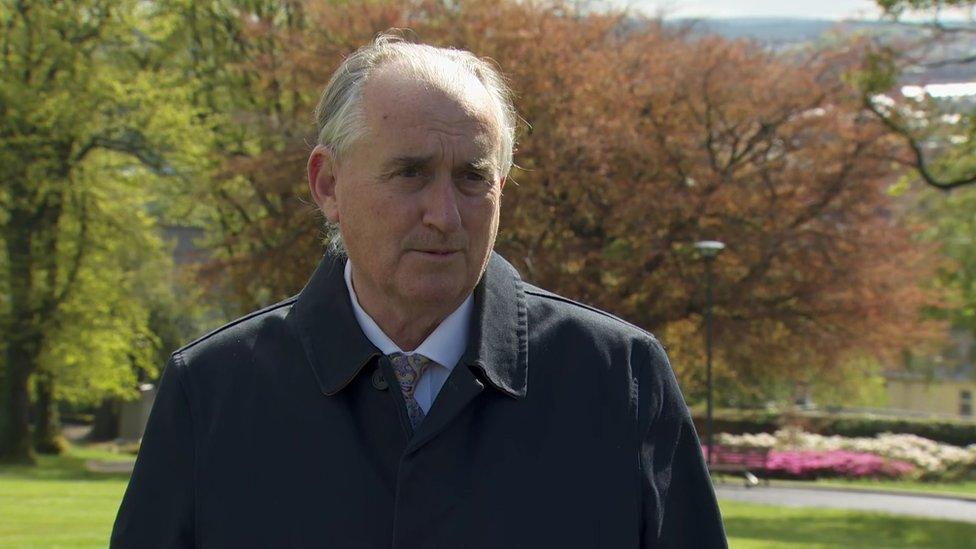
Derry-based journalist Eamonn MacDermott described the move as a "risky strategy" for Sinn Féin
"This is the party leadership in Dublin making a statement that they need to make changes in the north and they need to make them in advance of the next election."
Derry-based journalist Eamonn MacDermott described the move as a "risky strategy" for Sinn Féin.
"There could be people who will feel aggrieved for Martina and will say they will not vote for Sinn Féin anymore," he said.
Mr MacDermott added that he could not at this stage see obvious candidates to replace either Ms Anderson or Ms Mullan.
"The root and branch clear out could present problems in that there doesn't appear to be a second tier of leadership ready to step forward with a city-wide, county-wide profile," he said.
What has Sinn Féin said?
Asked on BBC's Good Morning Ulster programme last week, Finance Minister and Sinn Féin MLA for Newry/Armagh Conor Murphy said the review was an internal matter sparked by poor electoral performances at a time when the party had been doing well elsewhere.
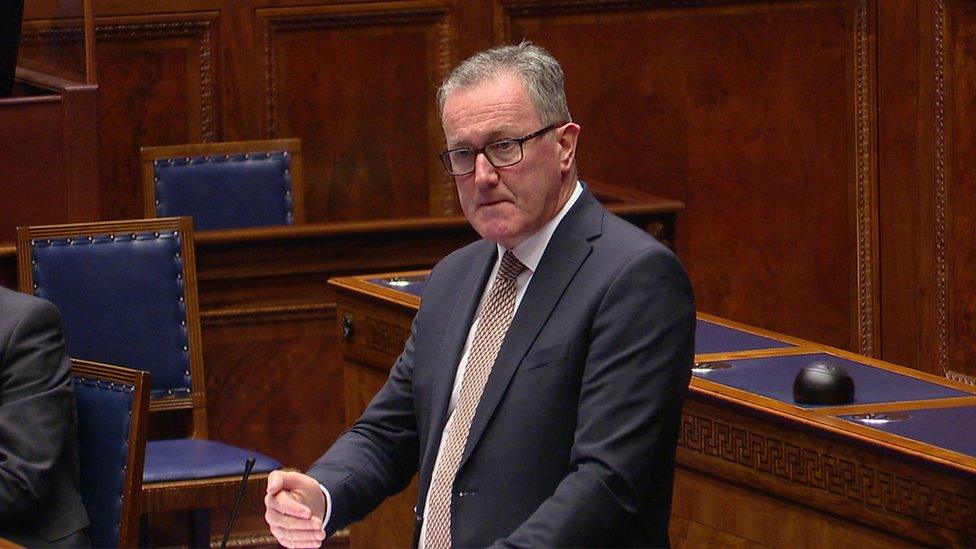
Sinn Féin's Conor Murphy said the review was an internal party matter
In a statement, external on Tuesday, Mary Lou McDonald paid tribute to both Ms Anderson and Ms Mullan.
She said Ms Anderson would "continue to lead as the prospect of a referendum on Irish unity comes ever closer".
Sinn Féin vice-president and Deputy First Minister Michelle O'Neill said her party colleagues had demonstrated "great leadership with what was undoubtedly a personally difficult decision".
BBC News NI has asked Ms Anderson, Ms Mullan and Sinn Féin for further comment.
Related topics
- Published29 April 2021
